

Tao Te Ching
Search Sages
Enter all or part of an sage's name or biography in the fields below, then press tab or enter to filter the list of Authors. Click the headings Name or Biography to sort by that column. Diacritics are ignored when searching.
Click on the author's name to go to their page.
| Author Name | Biography |
|---|---|
| R. D. Laing |  R. D. Laing R. D. LaingShaman, “acid Marxist,” counter-culture high priest, “Elvis of the psyche,” British counterpart to Timothy Leary, friend of Chögyam Trungpa, and psychiatrist to Sean Connery, the Beatles, Jim Morrison, and many other famous 1960’s icons; R. D. Laing was also a serious scholar who challenged orthodox psychology denouncing electro shock, chemical therapy, and the dehumanizing incarceration of the mentally ill. He developed Bateson’s double-bind theory, promoted safe haven centers, and the community-care model that has become today’s norm. Inspired by the Mahasiddha tradition of transmutation and growing the positive in perceived negative, he inspired techniques exemplified by the time he treated a patient with catatonic immobility by helping her get a job as an artist’s model. |
| Quintilian | 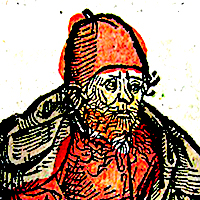 Quintilian QuintilianMaster of oratory, first advocate for a child-centered education, Roman rhetoriciann teacher to Pliny, and major influence on St. Jerome, Hippo, Juvenal, and John Stuart Mill; Quintilian also—according to Petrarch—“provided the inspiration for a new humanistic philosophy of education.” He became lost to history however until 1416 when Pogio while searching a filthy old dungeon found a copy of his masterpiece, Institutio Oratoria "buried in rubbish and dust.” A major inspiration in the development of humanism, on Bach’s music, and Martin Luther’s philosophy; Quintilian helped establish a solid intellectual foundation for the “words over the sense” and analyzed the symbolic, metaphorical, and figurative nature of language. |
| Queen Tiye | 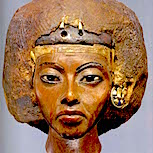 Queen Tiye Queen TiyeFirst proponent of monotheism Royal Wife of pharaoh Amenhotep III, mother of Akhenaten, and grandmother of Tutankhamun; little known Queen Tiye changed history by proclaiming for the first time a single god and inspiring the monotheism of Moses. A foreign-born, legendary beauty of black descent with a powerful, wise personality; she was worshipped as a goddess and helped rule Egypt for 37 years bringing her country to it’s highest point of international power and prosperity while creating a revolution and peak in Egyptian art. |
| Queen Mother of the West | 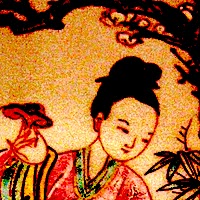 Queen Mother of the West Queen Mother of the WestFeminine principle embodiment Symbol of matriarchal preeminence, feminist role model, Taoist goddess of fertility and life, embodiment of Yin femininity, bringer of longevity, prosperity, and bliss; Wang Mu refused to submissively bow down to male superiority and disdained the typical Chinese attitude of always wanting male children, being disappointed with female births. Mythologized throughout Asia, she became an inspiration for women in China, Viet Nam, and Korea who had trouble passively following in the expected patriarchal role models. Although sited in accounts more than 1000 years before Lao Tzu’s time, she became one of the most popular symbols in Taoist tradition and—in at least one account—inspired and ultimately wrote with him the Tao Te Ching. Her influence and popularity continue today in many parts of the world and she is venerated in the Taoist Shangqing School. |
| Qu Yuan | 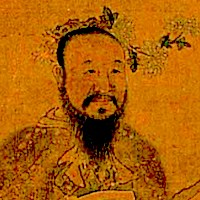 Qu Yuan Qu Yuan"King of the Water Immortals" Patriotic poet, politician, Chu royal clan official, and inspiration for China's Dragon Boat Festival; Qu Yuan wrote at least some of the Chu Ci (Songs of the South) poems—one of China's two most famous ancient collections. Slandered and exiled by corrupt officials while helping King Huai, the same thing happened while advising King Qingxiang causing him to spend his time collecting folk tales and legends while writing some of China's greatest poetry. In a deep depression from his exiles as well as the Qin State's conquering of his country's capital, he committed suicide as a way of protecting his integrity. Mao tried to replace Confucius with Qu Yuan as a cultural hero. |
| Qiu Jin | 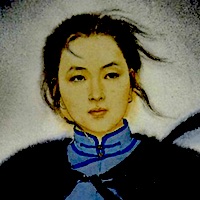 Qiu Jin Qiu Jin"China’s Joan of Arc" Feminist revolutionary, poet, Chinese national heroine, "Woman Knight of Mirror Lake"; Qiu Jin became a famous and inspiring historical martyr. Involved in a secret society working to overthrow the corrupt Qing Dynasty, she studied martial arts, wore Western male clothes, joined Sun Yat-sen's revolutionary group, and while in Japan edited a popular journal. She wrote and eloquently advocating women's right to education, to choose their own husbands, and the abolishment of foot binding. Her challenge to China’s entrenched patriarchy led to her—when only 31 years old—arrest, torture, and beheading. |
| Pythagorus | 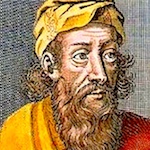 Pythagorus Pythagorus"The most influential philosopher of all time" The ancient Greeks called Pythagoras “the philosopher.” He discovered the numerical relationship between musical notes, the “music of the spheres,” gave geometry its main form, the Pythagorean theorem, and the name cosmos to the world. An elemental influence on Plato (The Republic considered based on the vegetarian, communistic community Pythagoras established) and the first to teach that the world is round and revolves around the sun, his influence extends to all of Western philosophy, Freemasonry, Rosicrucianism, mathematics, architecture, sculpture, art and music. Bertrand Russell considered him the most influential philosopher of all time. |
| Pyrrho | 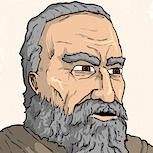 Pyrrho PyrrhoFather of the skeptic school of philosophy, painter influenced by Democritus into philosophy, and venerated high priest of Elis; Pyrrho travelled with Alexander the Great to India, met Magi and Eastern wise men who inspired his philosophy and lifestyle. Learning some Buddhism, he brought the Three marks of Existence teachings (suffering, impermanence, and egolessness) into the West and taught that for every statement, it’s opposite can be proposed with equal justification. A huge influence on the modern skepticism of Descartes, he was so respected and appreciated in his own time that philosophers were made exempt from taxation. |
| Protagoras |  Protagoras Protagoras“The wisest man alive”—Socrates Born poor and laboring as a porter, Protagoras was called by Socrates “the wisest man alive” and became a friend of Pericles, so respected that Plato wrote a book about him, and a philosopher so original that he started a thought revolution in ancient Greece with his theory of relativism. This led to an agnosticism that furthered science but aroused enough anger to expel him from Athens and have all copies of his books burned in the marketplace. His still famous statement that "Man is the measure of all things” continues his influence and his saying, “There are two sides to every question” has become a truism and idiom in most languages. |
| Proclus Lycaeus | 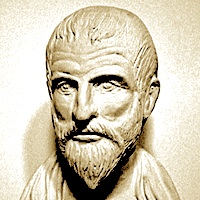 Proclus Lycaeus Proclus Lycaeus"The most influential Ancient Greek philosopher you've never heard of" Proclus synthesized Greek philosophy into one system, developed Neoplatonism to its height, and became an important influence on Western medieval philosophy as well as philosophy as a whole. He believed that Plato was divinely inspired and wrote extensive commentaries. He described philosophy as a primary method for raising consciousness above materialism and as a step toward “unification with the One.” With insight into the process of discovering the meaning beneath the sense, he advocated using words to see through the limitation of words and to discover the deeper reality. An inspiration for Ralph Waldo Emerson and the New England Transcendentalists, he taught the Platonic emphasis on “the One,” “Intellect,” and the “Soul.” |
| Prince Shotoku |  Prince Shotoku Prince ShotokuThe son of emperor Yomei, Shotoku inspired a devotional tradition of protecting Japan, the Imperial Family, and Buddhism. His commentary on three famous Buddhist sutras in 615 CE are considered the first Japanese text. He also wrote the first Japanese constitution and is credited with creating a strong and united Japan. Still revered, his picture is on the Japanese 10,000 yen currency note. |
| Powell Clayton | 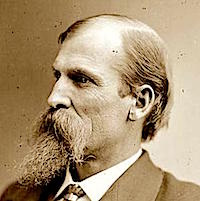 Powell Clayton Powell ClaytonPowell Clayton (1833-1914) |
| Poggio Bracciolini | 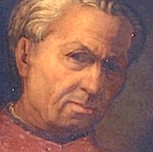 Poggio Bracciolini Poggio Bracciolini Gladiatorial orator, personal secretary to 7 popes including the “Antipope” John XXIII, scholar, early humanist, prolific and for his time astonishing writer; Poggio helped develop the Italic font, invented the Roman font still popular today, and helped spark a rebirth of old wisdom that led Europe out of the Dark Ages, into science and our modern age. Profuse traveller, friend to the great scholars of his time as well as politicians like Pope Nicolas V, Cosimo and Lorenzo de' Medici who supported his efforts to find and preserve ancient Greek and Roman manuscripts; he discovered and copied a large number of important classical works forgotten and decaying in old libraries including De Rerum Natura, Lucretius’ only surviving book. |
| Pocahontas | 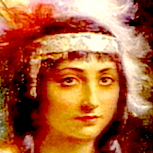 Pocahontas PocahontasDaughter of a powerful Native American Chief, savior of John Smith, supporter of the Jamestown colony, and the first Native American featured on a US stamp; Pocahontas was captured and held for ransom during an English-Indian war. Instead of returning to her tribe when she could, she stayed with the English, converted to Christianity and proceed to convert hearts and minds in both America and Europe. Her name literally means “little reckless” and she was called in Europe a "civilized savage" but history clarifies the European savagery, the Native American wisdom. Her descendants include two first ladies, Nancy Reagan and Woodrow Wilson's wife, Edith Wilson; actor Glenn Strange famous for his roles as Frankenstein’s monster and the Gunsmoke bartender; as well as astronomer Percival Lowell responsible for the discovery of Pluto and an important inspiration for H.G. Wells, Robert Heinlein, Ray Bradbury, and Edgar Rice Burroughs. |
| Plutarch |  Plutarch PlutarchTeller of tales and distiller of wisdom, philosopher, magistrate and Delphic priest; Plutarch was frequently paraphrased and quoted by Shakespeare. Ralph Waldo Emerson called his writings "a bible for heroes,” Montaigne's Essays include over 400 references, and he was admired by Boswell, Ben Jonson, Alexander Hamilton, John Milton, Louis L'amour, Francis Bacon, and Robert Browning. An example of Mencius’ sage whose words and actions cause the stupid to become wise, Plutarch remains an enormous influence on world literature as well as an example of finding meaning, inspiration, and profound lessons from experiences and events. |
| Plotinus | 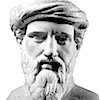 Plotinus PlotinusThe founder of Neoplatonism and inspiration for mystics of many traditions - Gnostic, Islamic, Polytheistic, Christian, Jewish - Plotinus was taken as an inspiration and guide by such diverse thinkers as Bertrand Russell and Ralph Waldo Emerson, Radhakrishnan and Coomaraswamy, Coleridge and Yeats, the Sunni and Ismaili Shia in Islam, emperor Julian and St. Augustine. He emphasized contemplation as a powerful, transforming practice and how mind shapes perception, rather than passively receiving something “objective.” His experience and teaching of the “union with the One” translates as an early Western version of the Eastern concept of “Enlightenment.” |
| Pliny | 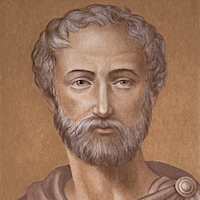 Pliny PlinyFounding father of the encyclopedia Roman natural philosopher, influential and prolific author, military commander, and a friend of emperor Vespasian; Pliny wrote probably the first and definitely the most influential encyclopedia, Naturalis Historia (Natural History). His only surviving manuscript, this comprehensive 37-book masterwork based on Stoic and pantheistic philosophy gives a unique window into Ancient Rome. Pliny died suddenly in 79 CE possibly while trying to rescue a friend and their family during the Mount Vesuvian volcanic eruptions. |
| Plato | 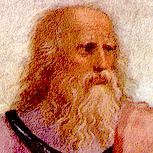 Plato PlatoFounder of the Western world’s first and longest-lived university, one of the most influential philosophers in all history; Plato used the influence of his teacher Socrates, the skill of his student Aristotle, and his own personal genius to establish the foundation of Western science. Founder of process philosophy, Alfred North Whitehead described all of European philosophy as “footnotes to Plato.” Nietzsche described Christianity as "Platonism for the people" and Christianity is indeed infused with Platonic thought that also profoundly influenced Saint Augustine, one of the most respected Christian philosophers. Platonic thought has continually revived through the ages dominating the Middle Ages, inspiring th Renaissance, and continues as a profound influence today. |
| Pindar | 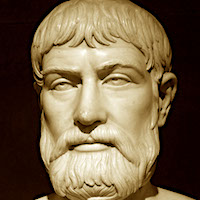 Pindar PindarArchetype of poetry One of the always-praised but almost never-read writers, Pindar wasn’t even popular during his lifetime though he was sought out and paid high sums for eulogies. Although only a small fragment of his odes remain and none of his music and dance displays; enough of the creative artistry and complex, beautiful structures survive to give Pindar an immortal place in world literature. He became popular again during the Byzantine Era and again when his style was emulated for the revived 1896 Olympic Games, the Athens Olympics in 2004, and the London Olympics in 2012. Horace thought anyone trying to imitate Pindar would be like Icarus, sure to fail. The splendor of his imagery, imagination, and style have brought some modern scholars to regard his work as “an archetype of poetry.” |
| Piers Brendon | 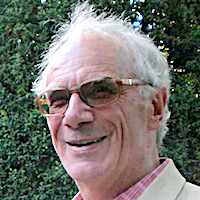 Piers Brendon Piers BrendonProfessor, journalist, and free-lance writer |